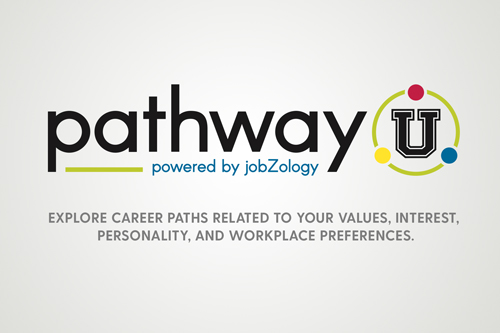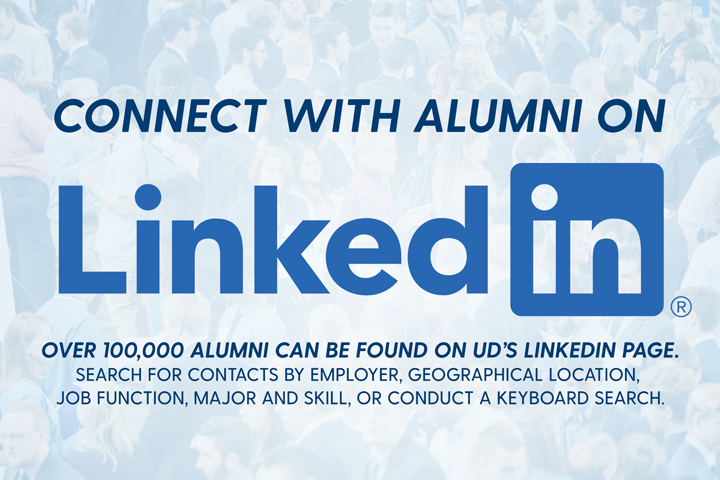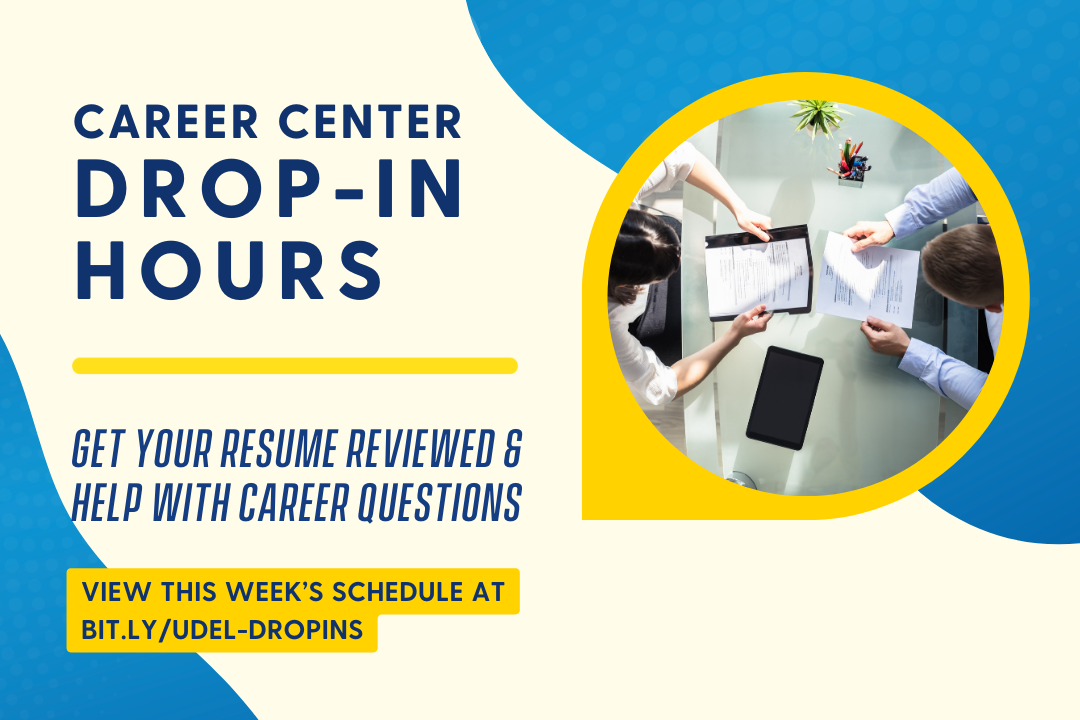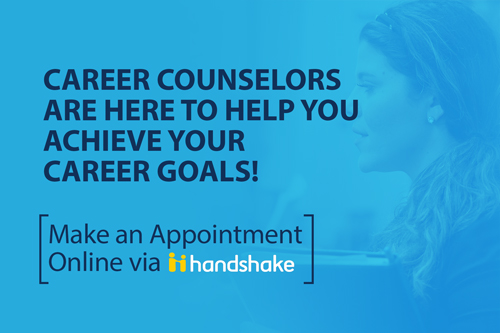
Prepare for Jobs

Prepare for Jobs & Internships
To be successful in your job or internship search it is important to prepare in advance. Employers are considering a variety of factors before they even meet with a candidate. Regardless of what type of job or internship you pursue, there are some basic elements that should be in place to set yourself up for success.
In addition to the resources below, it is important to make sure that your resume and cover letter are well done and that you are building a strong professional network. You may also want to conduct some informational interviews to find out if your current career of interest is actually the right career path for you.
The Career Center CANVAS site has modules designed to help you better understand and prepare for the internship or job you are seeking.
Polish your online presence: Now is the time to focus on your online presence to ensure you present yourself effectively to employers and professionals.
Digital brand: This is who you are perceived to be online. Ensure that you have fully completed profiles on both Handshake and LinkedIn. Make sure to express your skills and interests for potential employers to see.
Digital shadow: Your shadow is what people find out about you when searching online. Google yourself and consider setting all social media accounts to private, reviewing profile pictures and having a friend or family member assess your presence.
Digital engagement: What are you commenting on? Who are you following? How are you engaging in your professional platforms?
Use the Career Center Canvas modules on resume development to create or revise your resume/CV. Next you can use the Big Interview Resume feature or Career Center drop-in hours to get feedback. After that, if you need more help, schedule an appointment with a staff member through Handshake.
- Practice interviewing: Prepare for your next meeting with an employer. The Career Center provides you free access to Big Interview, an online service which allows you the opportunity to practice virtual interviews with hundreds of questions and options.
The Career Center offers free professional headshots on Monday through Friday from 9 a.m. to 4 p.m. No appointment is necessary to take advantage of this opportunity.
The Headshot Headquarters self-serve station is located on the second floor of the Career Center.
What we provide:
- Lighting
- Backdrop
- Private space
- Immediate access to your photos
What you provide:
- Your phone
- Your best professional self

UD alumni can help you learn about pathways into jobs and build a professional network that will support you long after graduation from UD. There are a number of opportunities to engage with Blue Hens this summer who can offer advice, serve as a connector for job and internship opportunities and provide informational interviews:
Virtual Job Shadow Program: Offered during Winter Session and summer, this virtual job shadowing program allows students to learn more about various professions, receive career-related advice and reflect on the ways in which their education can prepare them for life after college by conducting a 1:1 virtual information interview with an employer or alum.
UD’s LinkedIn page: Access more than 120,000 alumni to create meaningful professional connections. Search by industry, job function, skill set, location and employer name, and send personalized connection requests. Remember to be polite and briefly explain your reasons for wanting to connect!
Handshake’s Peer Messaging: Connect with students at UD and other universities. Search for students and alumni based on attributes like previous employers, student organizations or major.
These sites provide excellent opportunities to expand your career-ready skills and knowledge.
- Forage offers self-paced programs to build career skills and provide a simulation of the work done at a variety of companies.
- Coursera and EdX: Online learning platforms in which students can foster and refine their career readiness by taking flexible online skill-development classes.
LinkedIn Learning: All UD students, faculty and staff have free access to video tutorials and online courses designed to help in the achievement of personal and professional goals.
Khan Academy: Online training in computing, coding, finance, economics, entrepreneurship, LSAT, MCAT and GMAT.
- Codecademy: Access to 25 free introductory coding language and technology courses.
- Skillshare: Sign up for a two-month free premium account and access thousands of free 30 to 90-minute classes for your career, passions and everything in between.

VOLUNTEER
Volunteering is a good way to explore your interests and to give back to the local community. Non-profit groups need many different kinds of volunteers; opportunities can include one-time help with an event to weekly tutoring commitments. Serving as a volunteer can be a thoughtful component of your four year plan for academic and career goals.
The University of Delaware Career Center serves as a hub for connecting UD students and nonprofit organizations and agencies.
Volunteering offers an opportunity to:
- Explore your interests;
- Learn about a community-based organization;
- Make a contribution to an organization’s ability to serve its clients;
- Establish relationships for more in-depth activities (such as internships or funded summer immersion programs);
- Build skills for your resume and portfolio.
Find volunteer opportunities:
Individuals: Log into your Handshake account and search for volunteer opportunities. Respond directly to the organizations. For assistance, contact the Career Center!
Student groups: A group of students may be needed to help with annual events, such as those that raise funds or awareness for the organization. To find opportunities, a member of the student group can log into Handshake and search for volunteer opportunities.
Nonprofits, particularly service-focused organizations, are always in need of assistance.
Find volunteer experiences, including COVID-19 and virtual options:
The sites below host thousands of unique virtual and in-person, long-term and short-term volunteer opportunities.
National and local organizations working directly on racial equity:
Find a nonprofit for direct outreach:
Search the sites below and contact nonprofit organizations directly to work on projects or support their services. Share the skills you can provide them such as data input, evaluation and research on a program, translation and interpretation, outreach to donors, social media, etc.
Organizations recruiting a large volunteer base:
Red Cross: They offer both remote and community-based opportunities
Upchieve: Help students in need keep up with their coursework, especially those struggling with online learning.
Smithsonian Digital Volunteers: Take on important assignments to expand access to the Smithsonian's massive collections and participate in a variety of research programs.
Translators Without Borders: Whether you are interested in translating medical texts or translating for crisis response, there are engaging projects available to suit all preferences.
There are ample opportunities to get involved in public service and to support issues that matter to you. Volunteer or work for a local, state or national congressperson, a single issue organization or a political party. Almost all congressional offices and organizations will have information on their websites with ways that you can get involved. Some of the benefits of volunteering/working include:
Experience in fundraising, negotiating, direct marketing, event planning, cold calling, graphic design, database management, public relations and more
Build knowledge of current affairs
Gain networking opportunities and professional contacts
The University of Delaware Biden Institute has developed a resource list for UD students interested in getting involved in politics and policy:
- ACLU: Nonprofit organization that works to defend and preserve the individual rights and liberties guaranteed to every person in this country by the Constitution and laws of the United States. Click here to access a range of full-time and internship positions.
- Campaigns & Elections: Campaigns & Elections is a magazine that covers political campaigns, focused on tools and techniques of the political consulting profession. This website provides a list of both partisan and nonpartisan jobs.
- Democratic Congressional Campaign Committee: Click here to access a list of job openings, and find internships through this link.
- Democratic National Committee: To work directly for the DNC, there are positions posted through this link. The website also has links to state party offices.
- The Heritage Foundation: The Heritage Foundation is an American conservative think tank based in Washington, D.C., primarily geared towards public policy. Click here to view current openings.
- National Republic Congressional Committee (NRCC): NRCC is the Republican Hill committee that works to elect Republicans to the U.S. House of Representatives. Fill out job inquiry form through this link.
- Republican National Committee: To work directly for the RNC, there are positions posted through this link.
If you are interested in participating in research during the academic year, Winter Session or summer you can get involved by volunteering on a research project or enrolling in an independent study. Volunteering at the start of a project can help you to get a sense of whether or not you are really interested in a particular project, and you can then work more fully on it in the future as an independent study or senior thesis.
There are additional research opportunities available during the summer through Undergraduate Research Program’s Summer Scholars and Summer Fellows programs and during the academic year through the University of Delaware Research Apprenticeship Work-Study (UDRAW) program. Learn more about these initiatives on the Undergraduate Research Program website.

LEVERAGE SOCIAL MEDIA
10 RULES FOR USING LINKEDIN*
1. Your profile should contain a professional photo.
2. Use the headline space effectively—include your area of interest or study.
3. Create a summary that will stand out—use keywords that relate to your industry of interest and include general information on the type of positions you are seeking.
4. Include all relevant experience—leadership, volunteer experiences, internships and shadowing opportunities.
5. Get recommended! Ask for recommendations from professors and supervisors.
6. LinkedIn is similar to a professional Facebook—keep your LinkedIn professional, rather than social.
7. Use the “People You May Know” function on the right-hand side of the page to connect with others who are similar to you or share connections with you.
8. When sending a request to connect with someone, include a personalized note instead of the generic, “I’d like to add you to my professional network on LinkedIn.”
9. Utilize bullet points under each position description to make it easier for viewers to skim your responsibilities.
10. Create an honors and awards section and provide a short description of each achievement.
LINKEDIN TO-DO ITEMS:
Join Groups:
Joining groups such as the "Blue Hen Career Network" or "University of Delaware Alumni Network" will allow you to easily find other LinkedIn members to reach out to for career advice or informational interviews.
Use the University of Delaware college page:
- Click “Notables” to see established University of Delaware alumni, such as CEO’s, company presidents, and other industry leaders.
- Click “Students and Alumni” to see where they live, work and their industry. Utilize this tool to network and reach out to alumni in your field of interest.
- Optimize your LinkedIn profile by following the recommendations on the LI Learning video tutorial, Rock Your LinkedIn Profile.
THE PLATFORMS
The platforms listed below are based on current popularity statics, however the front-runners in social media could change at any moment so make sure to take advantage of the additional resources section to be able to recognize the current trends.
- Tailor your profile to a professional audience by summarizing your transferable skills and areas of career interest.
- View your friends as potential connections for networking.
- Provide resources related to your field of interest in your status updates.
- Use Graph Search to research companies.
- Like organizations related to your career of interest in order to get a better understanding of that company's goals and working environment.
- Make your profile bio professionally focused.
- Tweet parts of your resume.
- Live tweet events or speakers related to your career field of interest.
- Follow companies of interest.
- Follow relevant people in your career field of interest.
- Follow job related hashtags to find current postings.
- Use popular hashtags to promote your posts.
Other Social Media Platforms ![]()
![]()
![]()
Consider looking at social media platforms such as YouTube, Instagram, Pinterest and Storify to creatively build you professional brand. For example, you could use YouTube, Instagram and Pinterest to post videos and/or pictures of yourself doing service projects or a task at your internship. You could also use Storify to create a story board of all of your career accomplishments. Companies are looking for well-rounded, innovative employees and utilizing these sites could prove that you are the perfect candidate.
REMEMBER:
- Be authentic! Recruiters want to meet the person they saw on your social media site and inaccurate information could cost you valuable opportunities.
- Be reliable and recognizable across platforms.
- Don't be afraid to cross promote your social media sites.
- If you have a common name use your middle initial to differentiate yourself from the others.
- Make sure to give credit to your sources.
- Be professional!
- Be careful not only about your posts, but the posts in which other people tag or refer to you can be searchable and could be potentially damaging to your career.
- When creating content for posts ask yourself: "Would my grandmother approve of this?"
- Remember nothing is private on the internet!
OBTAIN REFERENCES
Potential employers will ask for references to speak to a candidate's character and work ethic. It is important to pay attention to what type of reference the employer requests. Typically companies are looking for professional references. However for recent graduates, they may also require an academic reference, such as a professor or research supervisor. Additionally, some positions may desire a personal reference, such as a friend to vouch for the candidate's integrity in all aspects of life.
A FEW TIPS FOR ENSURING STRONG REFERENCES:
- Always ask the individual in advance if they are willing to be your reference.
- If they are willing, provide them with pertinent information about the position and your qualifications for that position; you may even want to provide the reference with the latest copy of your resume.
- Be confident that your reference will say good things about you. If you are not sure, steer clear!

IDENTITY-BASED RESOURCES:
The UD Career Center is part of the Division of Student Life, which advances equity and inclusion, deepens student learning and drives holistic development through education, experiences and communities.




